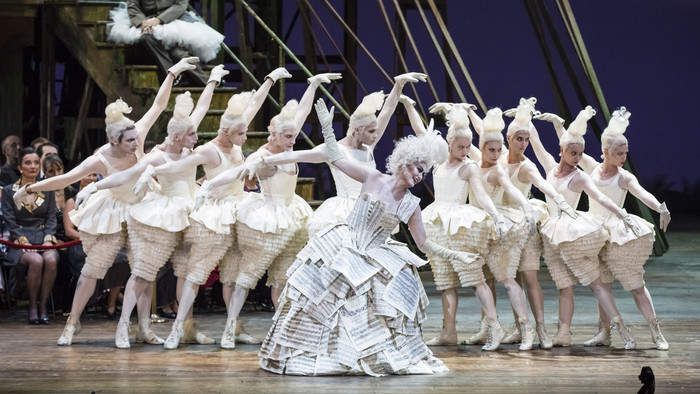Cast & Crew
Thespis – Mathias Vidal
Platee – Lawrence Brownlee
Un satyre, Cithéron – Nahuel di Pierro
Momus – Marc Mauillon
Thalie, la folie – Julie Fuchs
L'amour, Clarine – Tamara Bounazou
Jupiter – Jean Teitgen
Mercure – Reinoud Van Mechelen
Junon – Adriana Bignani-Lesca
Director – Laurent Pelly
Conductor – Marc Minkowksi
Set designer – Chantal Thomas
Costume Designer – Laurent Pelly
Lighting Designer – Joël Adam
Description
“A nymph reigning over a watery empire” or an “absurd Naiad”? Who exactly is Rameau’s strange creature sung by a countertenor and who shatters the conventions of opera? The ugly and conceited frog Platée is the victim of a machination of the gods who make her believe that she is loved by Jupiter. In this opera, composed to mark the marriage of the Dauphin Louis, son of Louis XV, to the notoriously unbecoming Princess Maria Teresa of Spain, Jean‑Philippe Rameau turns irony into the principal weapon of his score. This cruel yet moving farce returns to the stage of the Opera in a delightfully whimsical production by Laurent Pelly.
Summary
PROLOGUE
The Birth of Drama. Urged on by the Satyrs and the Maenads and aided by Thalie, Momus and Amour, Thespis proposes to create a divertissement to “correct the failures of humans” and also illustrate the absurdity of the gods themselves. The subject he chooses is the “ridiculous strategy” by which Jupiter once cured Junon’s jealousy.
ACT I
Mercure comes to consult Cithéron on how to cure Junon of her jealousy. Cithéron suggests that Jupiter feign love for the nymph Platée, queen of the frogs. Platée appears with her maidservant Clarine. She yearns for love and believes that a thousand suitors will fall in love with her. Cithéron introduces himself to Platée and she tries to seduce him. He rebuffs her advances and announces the arrival of Mercure who has come down to the nymph’s marshes to tell her of Jupiter’s imminent arrival and his love for her. A storm bursts out, provoking fear and confusion amongst the frogs.
ACT II
Jupiter descends in a cloud and appears before Platée ‐ first in the guise of a donkey and then an owl. Finally he appears in the form of a man and declares his love for her. He orders Momus and his attendants to organize a feast to celebrate his new conquest. La Folie appears with a harp borrowed from Apollo and performs a divertissement in song and dance for Platée.
ACT III
Junon is furious. Mercure proposes that, unseen, she observe the wedding between Jupiter and Platée. Jupiter and Platée arrive and take their places for the ceremony. Junon sighs impatiently yet everything is done to make her even more impatient. A series of entertaining divertissements are performed, first by Momus, disguised as Amour with a ludicrous bow, and then by la Folie. Everyone dances. When Jupiter finally comes forward to take the marriage vows, Junon rushes over to Platée and tears off her veil only to discover the ugliness and absurdity of the nymph. Bursting into laughter and cured of her jealousy, Junon returns to the heavens with Jupiter. Platée, hounded by the taunts of the peasants, returns to her marsh.
Platée: A batrachian nymph, she reigns over the marshes. Despite her ugliness, she is convinced that Jupiter is in love with her.
Jupiter: God of the elements, he governs the earth and the heavens, father of the gods and of men. His identifying attributes are the eagle and the thunderbolt.
Cithéron: The legendary king who gave his name to Mount Cithaeron.
Mercure: God of commerce and travel and, in Roman mythology, messenger of the other gods.
La Folie: An allegorical character symbolising gaiety.
Junon: Jupiter’s wife, protector of women, particularly those with a recognized legal status in the city – women who are legitimately married.
Amour: Son of Venus‐Aphrodite. In Greek mythology, the god of love and creative ernergy.
Momus: God of mockery, sarcasm and disguise, the “jester” of the Olympian deities.
Thespis: Semi‐legendary tragic poet of ancient Greece and, according to Athenian tradition, the inventor of tragedy.
Thalie: One of the nine muses: the muse of comedy and idyllic poetry.
Clarine: Maid servant to Platée.
Screenings
- Anapa
- Arkhangelsk
- Astrakhan
- Chelyabinsk
- Cherepovets
- Gelendzhik
- Irkutsk
- Ivanovo
- Izhevsk
- Kaliningrad
- Kazan
- Khabarovsk
- Krasnodar
- Krasnoyarsk
- Minsk
- Moscow
- Nizhny Novgorod
- Novokuznetsk
- Novorossiysk
- Novosibirsk
- Omsk
- Orenburg
- Penza
- Perm
- Petropavlovsk-Kamchatskiy
- Petrozavodsk
- Pskov
- Rostov-on-Don
- Ryazan
- Saint Petersburg
- Samara
- Saratov
- Sochi
- Surgut
- Tolyatti
- Tomsk
- Tyumen
- Ufa
- Veliky Novgorod
- Volgograd
- Voronezh
- Yaroslavl
- Yekaterinburg
Runtime
3 h. 0 min.with one interval
Language
Live screening: French,
Recorded screening: French, russian subtitles
16+
